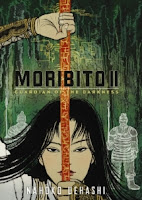 Author: Nahoko Uehashi
Author: Nahoko Uehashi
Illustrator: Yuko Shimizu
Translator: Cathy Hirano
U.S. Publisher: Scholastic
ISBN: 9780545102957
Released: May 2009
Original release: 1999
Moribito II: Guardian of the Darkness is the second volume of Nahoko Uehashi’s Guardian series of children’s fantasy novels. I absolutely adored the first book, Moribito: Guardian of the Spirit, so it was a very easy decision to pick up the second. Guardian of the Darkness was originally published in Japan in 1999 and was released in an English translation by Scholastic’s Arthur A. Levine Books imprint. I own both Guardian books in hardcover since Arthur A. Levine Books’ English editions, which include wonderful illustrations by the immensely talented Yuko Shimizu, are simply gorgeous. Like the first book, Guardian of the Darkness was nominated for a Batchelder Award (given to the best foreign language children’s book published in an English translation). Although, unlike the first novel, it did not win but did receive an honorable mention. Once again, Cathy Hirano has provided an excellent translation, one that is even better than her work on Guardian of the Spirit.
When she was only six years old, political scheming forced Balsa to flee her homeland of Kanbal with only her father’s best friend Jiguro as her protector, guide and companion. Jiguro was the leader of the elite King’s Spears and one of the country’s most respected warriors; to leave was not an easy decision for him to make. Decades later and after Jiguro’s death, Balsa returns to Kanbal, not realizing how greatly her entire homeland was affected by Jiguro’s decision and their disappearance. The people of Kanbal have a much different understanding of the events surrounding their flight. Balsa quickly learns that there is more to the story of her and Jiguro’s shared past than she previously knew. She also discovers parts of Jiguro’s life of which she was unaware—the man she grew to admire and depend on was a much more complicated person than she realized.
While Balsa is the main protagonist, I actually consider Guardian of the Darkness to be Jiguro’s story. Obviously, Balsa is a very important part of that story—their lives were irrevocably entwined and even after his death Jiguro continues to influence Balsa. He will probably continue to do so for the rest of her life. Guardian of the Darkness allows Balsa to come to terms with this and better understand her mentor. Uehashi’s characters are wonderful. Even through the fantasy veneer of the story, they come across as real people with real problems. They make mistakes and must learn from them and deal with the results. They have goals and desires. Good intentions can be clouded by selfish motivations. There are no real villains in the story, just incredibly driven but unfortunately misguided individuals who are trying to do the best they can with the opportunities they are given.
Although some references are made to the first volume, it is not necessary to have read Guardian of the Spirit to enjoy and appreciate Guardian of the Darkness. If I had to choose a favorite, I would probably lean towards the first novel. But honestly, I truly loved both books. Uehashi is a fantastic storyteller, creating a complex world full of greys that can be enjoyed by older and younger readers alike. Because the books are aimed towards children, they are fairly easy reading and not terribly long, but this does not mean they are lacking in the depth of their characters or story. I can easily recommend both Guardian of the Spirit and Guardian of the Darkness to any fan of fantasy and even to many readers who are not. If I have one lament, it is that the rest of the Guardian series is unlikely to see publication in English; the last I heard, the series had been put on indefinite hold. I cannot begin to explain how greatly this breaks my heart, but I will continue to treasure the first two volumes and encourage others to read them as well.

